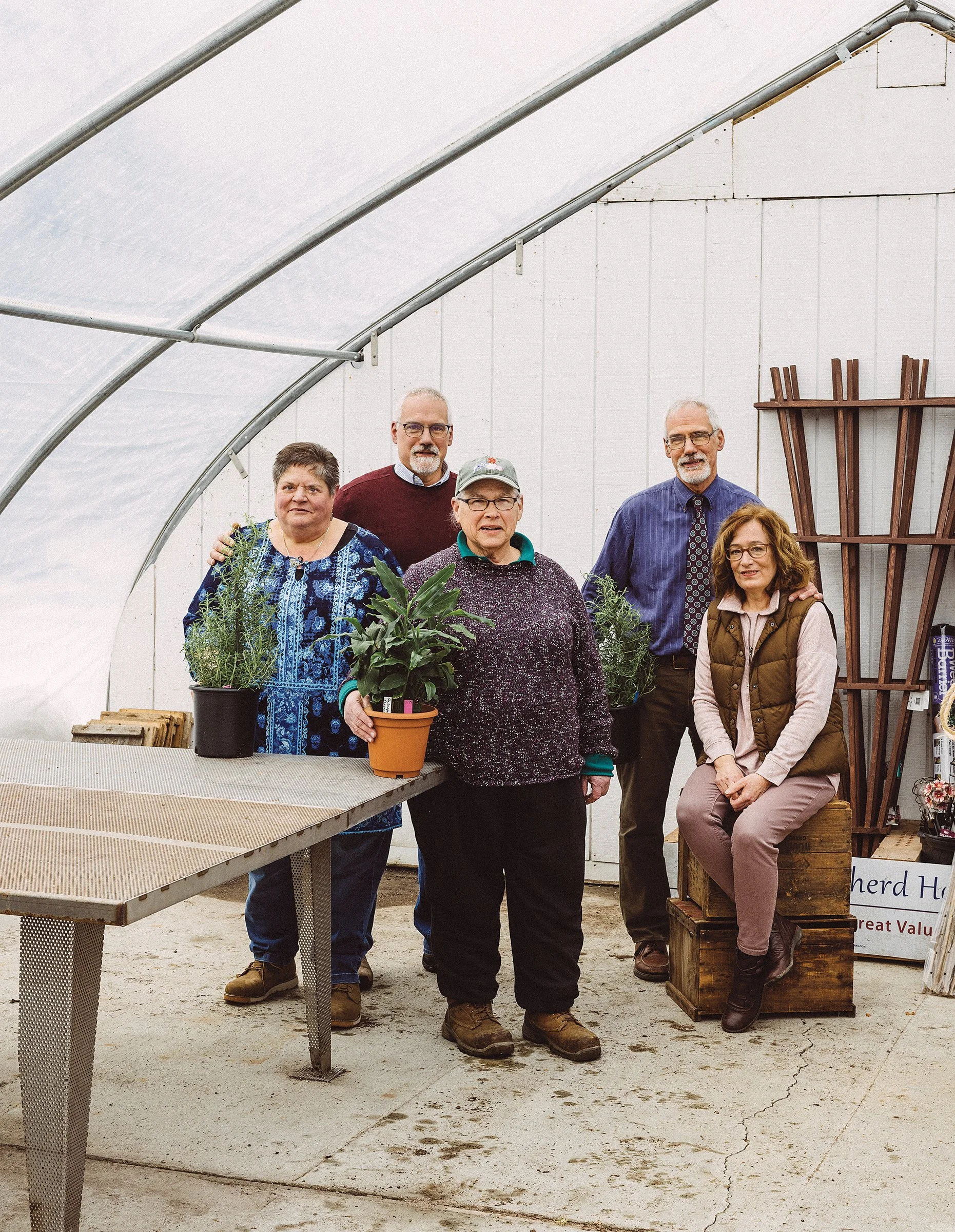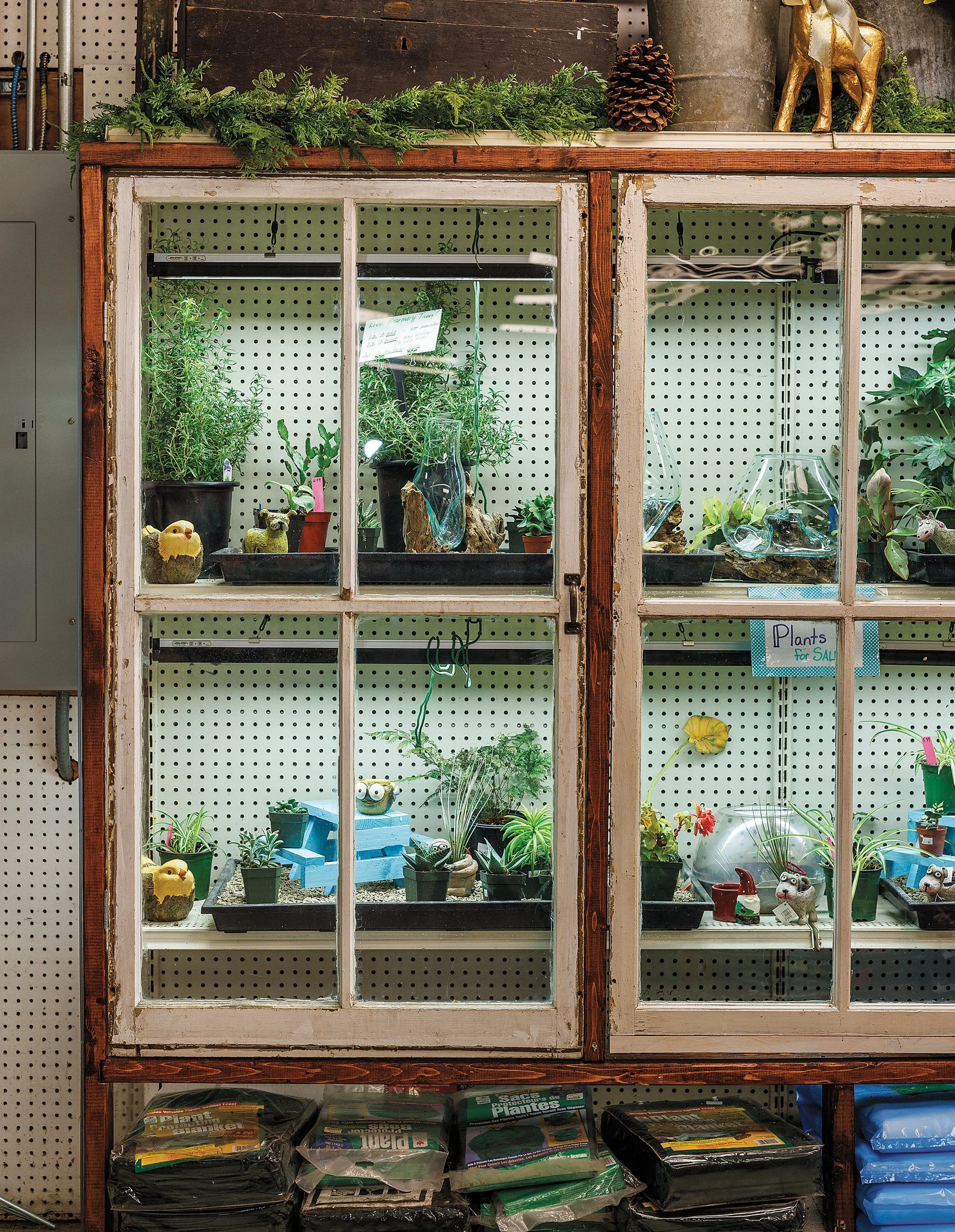Re-Potted and Thriving: A family effort brings new life to the Gardner Agway
Photos by Adam DeTour
One hundred years ago, farm supply stores were a fixture in rural Massachusetts. Farmers relied on them as a source of feed for livestock or fertilizer for crops. They were an important focal point in the community where farmers could get valuable information on crops, hear from neighbors about their success or failures with the latest variety of wheat or commiserate about the weather.
Any farm kid from Central Mass has memories of visiting the farm supply store, co-op or—in later years—the Agway. For ML Altobelli and her siblings, who grew up on the family farm in Westminster, it was the United Farmers Co-op in Fitchburg, where they accompanied their mother to buy feed for their dairy goats.
“I remember the creaking sound of its wooden floors and the smell of bags of feed on the shelves,” ML says. Visits to the farm store were an adventure for the four Altobelli children, who spent much of their time roaming the 13 acres of farmland that has been in the family since 1756.
“My mother had us raise goats to teach us responsibility,” says ML, who also learned to love the outdoors. “I never wanted to work inside.”
And she didn’t. After college, ML worked for Sterling Greenery where customers’ questions about plants that didn’t thrive—or weeds that did—set her on a lifetime of accumulating information and experimenting with techniques to bolster the deficiencies of New England’s soil. In 1990 she launched a sustainable landscaping business, ML Greenery in Motion, and in the ensuing years she turned to the Gardner Agway in a neighboring town for help in finding organic and sustainable supplies.
ML became involved in the agricultural community of Westminster as chair of the town’s Agriculture Commission. The commission supports a variety of educational workshops and seminars—from raising plants to raising animals—and regulates the town’s popular farmers market that runs from April through October.
She helped found the Ecological Landscaping Association, supported the Bionutrient Food Association in Barre and has given numerous workshops on these topics. She taught dozens of area gardeners how to grow lush plants by improving the health of their soil.
ML was a steady customer at the Gardner Agway, and then one day in 2019, she learned that after 38 years in business, the owner wanted to sell.
“I didn’t want the region to lose access to a farm and garden center,” she says. If the Gardner Agway closed, it would mean almost an hour’s drive to the nearest source of supplies. Complicating matters, a big-box farm supply store had opened nearby, but offered neither the expertise nor the brands sold by the Agway store.
ML turned to her sister-in-law, Jackie, who worked in commercial real estate in New York, to ask if she knew of any prospective buyers. Jackie’s initial response was, “No,” and the store remained for sale.
Within a few years, however, a confluence of events changed the lives of the Altobelli family and the future of the store.
Jackie and her husband, Stephen (ML’s brother), who also worked in New York, bought the Westminster home of Stephen’s great-grandmother as a weekend getaway. It proved to be their remote work site when Covid caused much of New York City to close in March 2020.
“The longer we stayed in Westminster, the less I wanted to leave,” Jackie says. She gave up her job in New York and took another look at the Agway. “What if we bought it?” she asked the Altobelli family.
Bolstered by Jackie’s property management experience and ML’s expertise in plants and soil, the two persuaded the other Altobelli siblings to join the venture: brother Dana and his partner, Jane Stafford, both teachers at Westminster’s high school, and sister Margherita, who manages the family farm.
Dana was recruited to build display tables, fixtures and potting benches. Jane was intrigued at the prospect of developing a network of local artisans and small businesses that could display and sell their wares at the store. As a result, the store now features an assortment of giftable items made by local and regional crafters.
“I also love gardens and animals,” Jane adds. “The store checks every box for me.”
After months of negotiations the Altobelli family became the owners of the Gardner Agway in September 2022, changing the name to The Good Earth Farm & Garden Center.
They faced a daunting task of clearing out debris that had accumulated over 38 years on the six-and-a-half acres where the business and warehouse are located. The interior of the 5,000-square-foot store was in desperate need of updating. Brush and vines covered the entrance to the greenhouse, and branches of trees that were growing up against the store threatened the integrity of a portion of the roof.
Everyone in the family—and their friends—pitched in to renovate the site. ML brought in native plants including cultivars to support local pollinators; near the entrance to the store she built a raised bed filled with flowers. Stephen drove the forklift in the warehouse, Jackie managed the finances and waited on customers, Margherita did accounting, advertising and worked the cash register on Saturdays. Dana and Jane spent weekends and summer vacation making the store and its contents look fresh and appealing.
“There was an endless amount of deadheading of plants, watering and weeding,” says Jane.
“It was an extraordinary amount of work,” concedes Stephen.
ML soon realized it was impossible to continue her landscaping business and shuttered it. But she decided to continue the workshops she had developed on topics like how to develop healthy soil and raised bed gardens as well as regenerative insect and disease control. Within a month after acquiring the business, she was demonstrating how to use mineral mixtures to bolster garden soil to a class at a table set up in the back of the store.
ML’s passion for improving the soil, and therefore making her corner of the world a better place, prompted her to plan future workshops on growing mushrooms and basic hydroponics. There’s also a demonstration project on site for one of her pet projects: hugelkultur, an ancient way of making raised beds from rotting wood and compostable plant materials. It’s but one of many horticultural topics that can be investigated at the store’s reading nook, a shelved collection of books and publications with a comfy chair nearby for browsers.
The family has been gratified by support from customers and members of the community. “So many people stopped by to wish us well,” ML said. Word about the new owners spread quickly and the North Central Massachusetts region has welcomed the rebirth of the store.
On a recent afternoon a steady stream of customers came in with questions or problems to solve. One young man brought in four scraggly looking pothos plants; ML gave him a speedy course on plant care and revived the plants by repotting them with a boost of organic fertilizer. Another customer needed help with his puppy’s digestive problems; in stock was therapeutic feed. Yet another customer was searching for a cat’s food bowl that could be attached to the floor. Although there was no such item on the shelves, ML suggested cutting a sheet of adhesive shelf paper to fit the bottom of the bowl.
“There’s a dearth of information on healthy plants, animals and soils,” she says, “so we spend a lot of time on problem solving.”
Pet owners currently make up the largest segment of the store’s customer base. They come in searching for food and bedding for their dogs, cats, rabbits, gerbils, chickens, chinchillas, even a hedgehog. A few recent inquiries about feed for domestic tropical birds has ML and Jackie planning to fit in supplies for owners of parakeets and parrots. This is in addition to feed for livestock. The store became a distributor for high-quality feed produced in northern New England for farm animals and has ramped up its wholesale orders.
“We’re not just selling pet food, animal feed and plants,” Stephen says. “Our niche is to provide better- quality products and information. We care, and that’s the difference.”
A year and a half after becoming agricultural retailers, “We’re way ahead of where I thought we’d be in customer traffic,” says ML.
This spring, to meet with increasing demand for chickens, the store will stock sexed chicks—females only. Its big-box competitor sells straight-run chicks, which means customers have a 50-50 chance of getting a male, rooster chick. “The county currently has a problem of an oversupply of roosters with no facility for processing them,” notes ML.
Garden sales were zero when we took over,” ML continues, “but have exploded since. Back in December, customers were coming in with their list of plants they wanted to order for spring,” she adds.
The store sources its garden plants from Howes Farm, a third-generation family-owned grower of plants, flowers and vegetables with greenhouses in New Braintree and a farm stand in Paxton.
The greenhouses at The Good Earth Farm and Garden Center were filled with locally sourced plants last summer and ML expects to add even more in the months ahead. There are tables and chairs near the plants where customers can take a moment’s rest. “Last summer I’d come in a few minutes early so I could take a cup of coffee out there just to sit and admire it all,” says Jackie. “It was like a haven.”
Her life and the lives of the entire Altobelli family have changed in ways none of them would have imagined. Since becoming the owners of the area’s farm store, they’re also helping to preserve a valuable resource for the community.
The Good Earth Farm and Garden Center
633 West Broadway, Gardner MA
thegoodearthfgc.com
This story appeared in the Spring 2024 issue.


